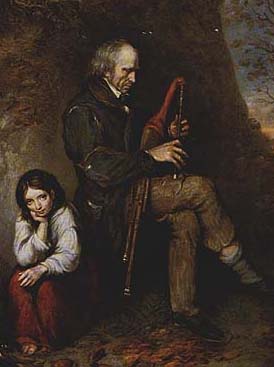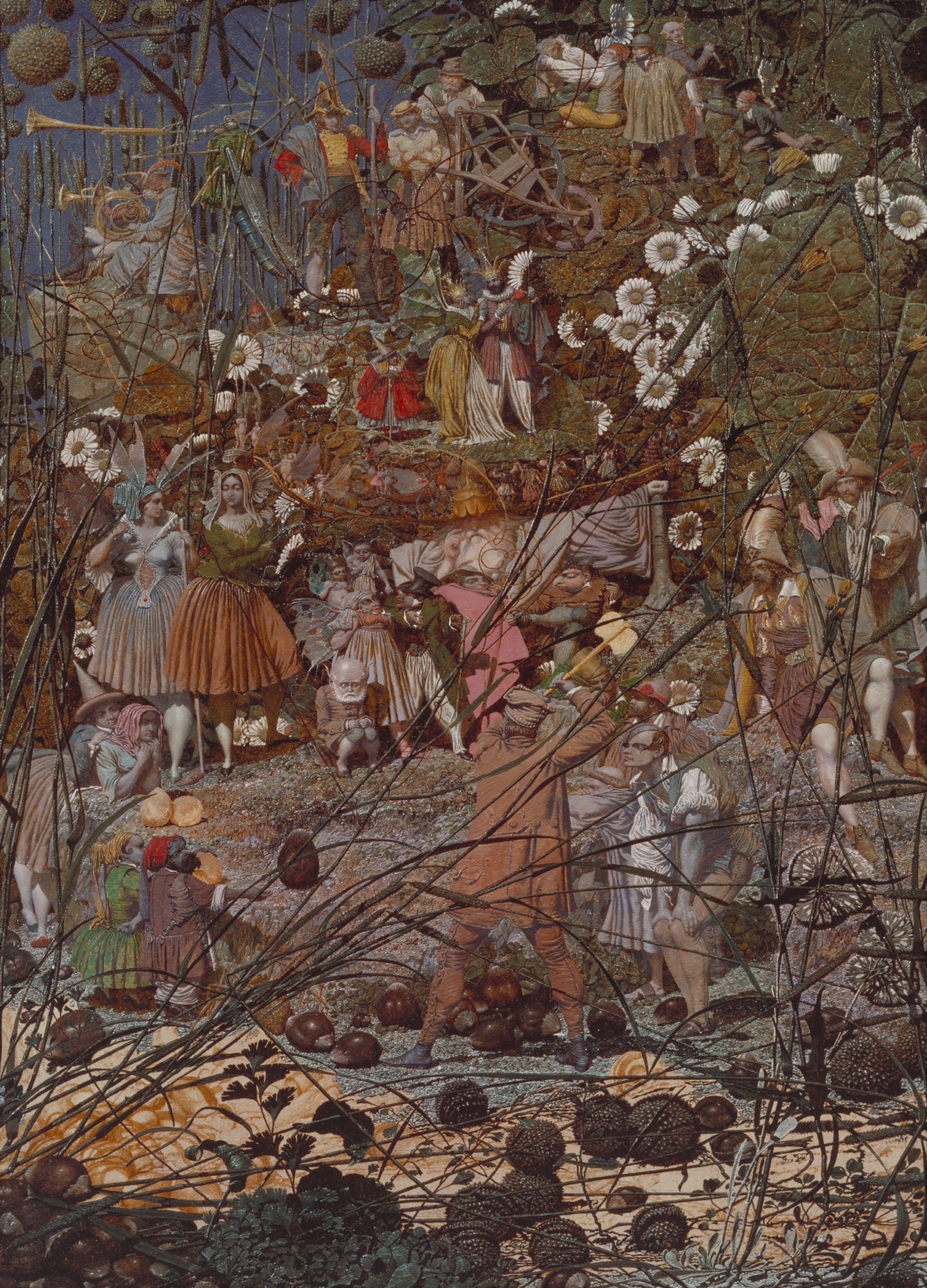Uilleann pipes

Hello all youse,*
Five musicians huddle around a bench in the corner of The Cobblestone, a wood-panelled pub in the heart of Dublin: two fiddlers, an accordion player, a flautist, and a man holding what appears to be several recorders jammed into a deflated rugby ball. They're playing Irish folk music, a jaunty repetitive rhythm which becomes somewhat trancelike, like what I imagine you'd hear at a pirate rave.
A group of trad musicians at The Cobblestone, on a different night.
I can't take my eyes off the man with the strange bagpipe-like instrument. It seems to require a dozen simultaneous co-ordinated actions: he's playing one of the upright pipes like a flute with the fingertips of both hands, and also holding chords across the other pipes with his wrist, and also rhythmically squeezing the bag between his elbow and his waist. Learning to do this must have taken years of practice. One of the other rapt listeners tells me they're uilleann pipes, and that the Mulligan family have been playing Irish music in this pub for five generations now, and maybe longer, no-one remembers.
Irish strangers are very happy to chat to you, something I don't realise how much I've missed, living in repressed England.
I'm in Dublin on a brief city break, desperate to escape the ongoing rainy February London gloom, swapping it for some rainy February Dublin gloom, which at least has the benefit of being new gloom (to me). I'm hoping the change of scenery will brush some cobwebs out of my brain. It feels ridiculous to complain about feeling burnt out from being a writer, surely the most self-indulgent of careers. And yet, I do feel burnt out. Exhausted. "Thin, sort of stretched, like butter scraped over too much bread," in the words of Bilbo Baggins, someone who would have felt right at home here.
The thing everyone tells you to do in Dublin is to go to one of the old pubs and listen to "trad music", as they call it. This pub smells of Guinness and oak, and there are oil paintings on the walls showing people playing these same instruments 200 years ago. There is no sheet music; these are songs which have been passed down ear to ear for generations. You can find small groups of musicians gathered in the corners of pubs like this most nights, honouring an old tradition, perpetuating their culture. The musicians are local heroes, but few of them make a living from doing this.

I often think about how making art is a fundamental human activity. People have been singing and drawing and telling stories for as long as people have been people. In a healthy culture, I think, making art is seen as a skill much like cooking: sure, professional chefs exist, but cooking isn't something only professional chefs do. Most of the meals you eat are made by your kith and kin. Most of the best meals you eat are made by your kith and kin. Cooking is a skill everyone is encouraged to learn, encouraged to practice every day if it brings them pleasure. All art should be like that.
By contrast, I'm struck by how often I meet people who draw, or write, or sing, or play an instrument, but when they tell you about it, very quickly caveat, "oh but I'm not an artist/writer/musician", like it's an embarrassing thing to admit that you make art but do not pay your bills with it. Like "artist" is only a noun you can BE, only to the exclusion of all else, rather than something that you can DO. That we can all do, in a myriad of ways.
A few years ago, after I'd published a bestselling nonfiction book, and a picture book, and some short stories, and was writing kids TV shows, I remember sitting in my psychologist's office and telling her I still didn't feel like I was a real writer. Because I hadn't published a novel. Because I still had a day job that paid my rent. And she cocked her head at me and said, "Are you waiting for the International Society of Writers to give you a 'I'm a Real Writer' card? You're writing. You're a writer. Whose permission are you still waiting for?"
My favourite place in Dublin so far is the Leprechaun Museum. You enter a room designed to look like an old hut, and vivid storytellers tell you some of the old Irish legends and folk stories. This, too, is a tradition passed down through hundreds of years. Historically, bards would go from home to home and tell stories in exchange for food and a place to sleep for the night. They were called seanchaithe, and they could recite long epic poems, share local news and gossip, and tell bawdy or scary stories to entertain families during long winter nights. Netflix before there was Netflix, repositories of stories before most people could read. If you want to hear some of these stories, the museum has a podcast!
Seanchaithe made storytelling their craft, but walk around Dublin and you'll soon realise everyone and her dog is a storyteller here. In just a few days in the country, I heard rambling, hilarious, vivid stories from waiters, taxi drivers, bar servers, shop attendants, complete strangers at the tram stop. At this latitude, the sun sets at four p.m. in winter. There's a lot of time for storytelling.

There's a political dimension to all of this. Culture isn't a neutral thing that's simply passed along. There's been a distinct effort to revive elements of Irish culture since the nineteenth century (the Gaelic revival), and it's gone hand-in-hand with the struggle to overthrow English colonialism. The English denigrated and suppressed Irish culture, to reframe their domination as a benevolent "civilising" mission (take British Prime Minister Benjamin Disraeli calling them a "wild, reckless, indolent, uncertain and superstitious race" or this 19th century Punch cartoon depicting the Irish as monkeys... any of this sounding familiar, South Africans?). The Irish language was almost extinct by the time the English were thrown out in the 1920s; now it's a mandatory subject taught in every school. The roots of Irish trad music and folk stories are old, but contemporary efforts to celebrate them have been an explicitly nationalistic project. Taking pride in Irish culture has been a key component of postcolonial liberation.
In just a few decades at the end of the 20th century, Ireland went from one of the poorest countries in Europe to one of the richest, and it's wonderful to see how much money they have invested in celebrating Irish culture. Every bookshop is filled with local books. Tourism is designed around Irish music, art and literature. Every public road sign is bilingual. There are plentiful public grants for authors and artists. It gave me pangs, thinking about the rich possibilities for South African culture (and tourism!), if we could only support and celebrate our own artists in the same way.

The history of colonialism in Ireland is different to the history of colonialism and Apartheid in South Africa, but their history of struggle against oppression does chime with ours in some ways that I found quite moving. (Of course, things are never that simple; some Irish people were colonisers in India and Africa, as well as people colonised in their own countries – history is complicated and there are no Goodies and Baddies.) But to walk around Dublin is to walk around a city with a clear sense of rediscovering itself, of taking pride in itself.
And in every pub, people are telling stories and making music with their friends, not waiting for anyone's permission, being a part of it.
It's pretty damn lovely.
Wishing you a glass of Jameson Black Barrel if you partake!
Your local seanchaithe,
Sam
P.S. Are you someone who makes art but doesn't feel like you can call yourself an artist (/writer/musician/...)? Email me and I will send you a "I'm a Real Artist" card! I need you to tell me a bit about the art you make :)
*Like Indian South African and Southern U.S. "you all/y'all", the Irish have a charming plural version of "you", as do most languages! Standard Modern English is the outlier for NOT having a separate plural form of the second-person pronoun. In Old English, "thou" was the singular second-person pronoun and "ye" was the plural. Thank you for tuning in to today's episode of Nerdy Linguistics Tangents with Sam.
Some other lovely Irish things:
- Teen books: One of the most enduring Irish folk stories is that of a changeling, when the Other Folk (Fairies/Fey) steal a human baby and replace it with a log or an old fairy enchanted to look like the child. I've recently re-read two fave dark riffs on that premise, Krystal Sutherland's House of Hollow (young adult) and Frances Hardinge's Cuckoo Song (marketed as 12+, but honestly one of the creepiest books I've ever read). I love them both!
- Adult books: To get in the Irish mood, I've been reading Anna Burns' Milkman, a brilliantly claustrophobic novel about the Troubles (I highly recommend the audiobook), and Paul Murray's The Bee Sting, an irresistible family comedy-drama.
- Music: All-time favourite indie-rock band The Decemberists have a new song out ("Burial Ground") and are touring this year and I am FROTHING with excitement. They write these long bardic story-songs rich with historical allusions, my kryptonite. They're from Oregon, but the sound is heavily influenced by Irish folk music via sea shanties. One of my best hiking memories is walking the Whale Trail singing all nine minutes of "The Mariner's Revenge Song" with my friend Jon Keevy from memory.
- Activities: If you find yourself in Dublin, in addition to listening to trad music at the pub and going to the Leprechaun Museum, may I recommend the walk from Bray to Greystones, the Literary Pub Crawl, seeing the famine memorial, eating the wild garlic gnocci at L. Mulligan, visiting Chapters and Hodges Figgis bookshops (where it was delightful to spot my and Dale Halvorsen's book baby Girls of Little Hope) and paying homage at the Gay Spar.
- Newsletters: Bestie Lauren Beukes visited Dublin with me, and recently launched her own newsletter! It's an absolute treat, filled with book and TV recommendations and reflections on the writing life. Subscribe here.





Member discussion